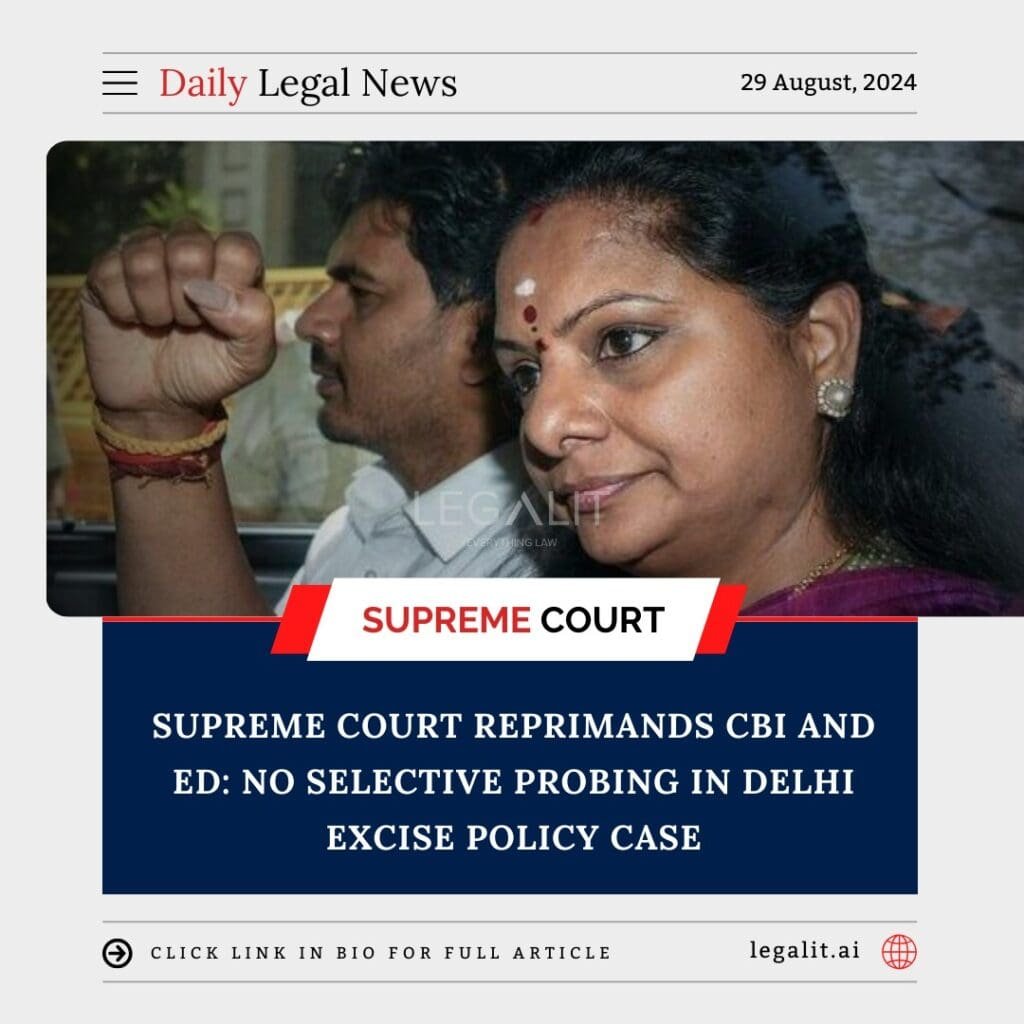
In a significant development, the Supreme Court of India has issued a stern reminder to the Central Bureau of Investigation (CBI) and the Enforcement Directorate (ED) regarding their conduct in the Delhi Excise Policy case. The Court’s remarks underscore the principle that investigative agencies cannot selectively target individuals while overlooking others implicated in the same case.
Context of the Case:
- Delhi Excise Policy Case:
The Delhi Excise Policy case revolves around allegations of corruption and irregularities related to the liquor policy implemented by the Delhi government. The investigation has drawn considerable attention due to its high-profile nature and the involvement of prominent political figures. - Supreme Court’s Intervention:
The Supreme Court’s involvement in the case has been crucial in addressing concerns about the fairness and integrity of the investigations conducted by the CBI and ED. The Court has scrutinized the procedural aspects of the probes to ensure that they adhere to legal standards and principles of justice.
Key Points from the Supreme Court’s Remarks:
- No Selective Targeting:
The Supreme Court has emphasized that investigative agencies must conduct their probes impartially, without selectively targeting specific individuals. The Court’s remarks reflect a concern that focusing on certain accused while ignoring others undermines the fairness of the investigation process. - Ensuring Fairness:
By reprimanding the CBI and ED, the Supreme Court aims to ensure that the investigations are conducted transparently and equitably. The Court’s directive is intended to prevent any bias or partiality in the handling of the case, thereby upholding the principle of equal treatment under the law. - Accountability of Agencies:
The Court’s intervention also highlights the importance of holding investigative agencies accountable for their actions. The CBI and ED are expected to follow established protocols and ensure that their investigations are comprehensive and free from undue influence.
Implications of the Ruling:
- Impact on Investigations:
The Supreme Court’s reprimand may lead to a reassessment of the ongoing investigations. The CBI and ED will likely be required to address any discrepancies or selective approaches in their probes to align with the Court’s directive. - Fairness in Legal Proceedings:
The ruling underscores the need for fairness and impartiality in legal proceedings. It reinforces the principle that all individuals implicated in a case should be treated equally and subjected to the same level of scrutiny. - Public Trust in Institutions:
Ensuring transparent and unbiased investigations is crucial for maintaining public trust in law enforcement agencies. The Supreme Court’s intervention aims to bolster confidence in the judicial process and reinforce the credibility of investigative institutions. - Precedent for Future Cases:
The Supreme Court’s remarks may set a precedent for how similar cases are handled in the future. It highlights the judiciary’s role in overseeing and ensuring the integrity of investigations conducted by various agencies.
Broader Context:
- Judicial Oversight:
The ruling illustrates the Supreme Court’s role in overseeing the actions of investigative agencies and ensuring adherence to legal standards. Judicial oversight is a fundamental aspect of maintaining accountability and upholding the rule of law. - Challenges in High-Profile Cases:
High-profile cases often attract intense scrutiny and can present challenges related to fairness and impartiality. The Supreme Court’s intervention in this case reflects its commitment to addressing these challenges and ensuring a just outcome.
Conclusion:
The Supreme Court’s reprimand of the CBI and ED in the Delhi Excise Policy case serves as a crucial reminder of the principles of fairness and impartiality in legal proceedings. By emphasizing that investigative agencies cannot selectively target individuals, the Court reinforces the need for transparent and equitable investigations. This ruling aims to uphold the integrity of the judicial process and maintain public confidence in the legal system. As the case progresses, the adherence to these principles will be vital in ensuring a just and unbiased outcome.